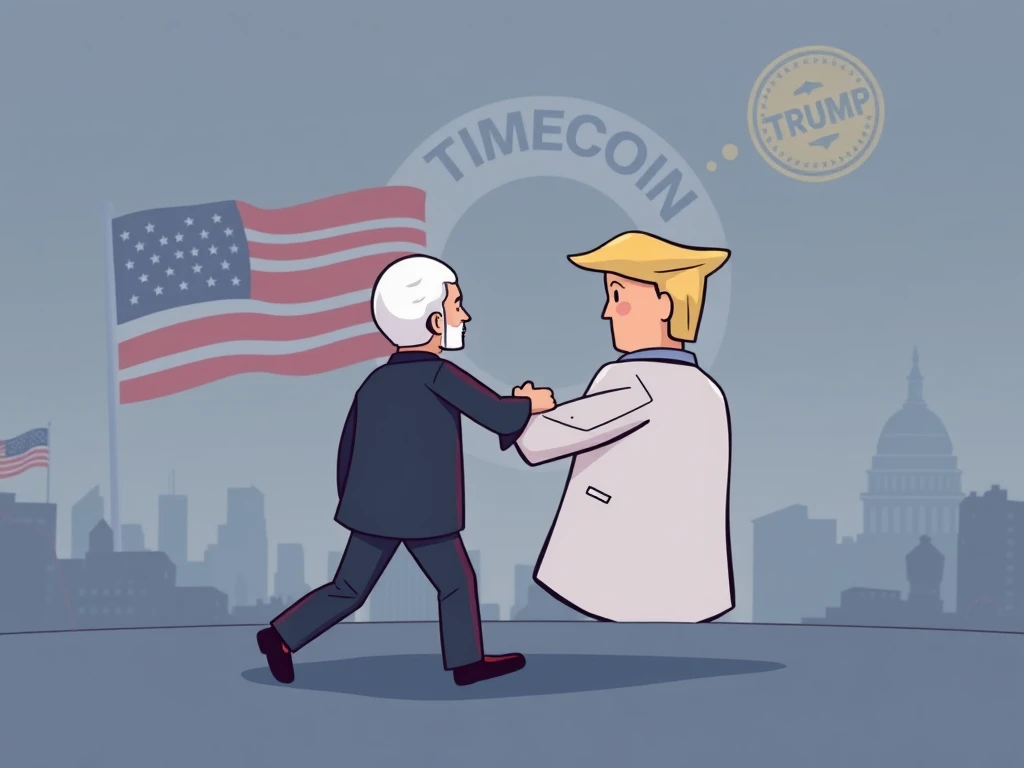TikTok: Explosive Denial of TRUMP Memecoin Buy Accusations

Are major social media platforms secretly buying political memecoins? That’s the core of a recent accusation that has sent ripples through the crypto world and political circles. This controversy centers around **TikTok** and claims involving the **TRUMP memecoin**, sparking debate and denials.
**TikTok** Responds to Serious Accusations
The drama unfolded when California Democratic Representative **Brad Sherman**, known for his critical stance on cryptocurrencies, made a bold claim. He alleged that the Chinese owners of **TikTok** were planning to buy $300 million worth of “Trump Coins.” This accusation quickly gained traction, suggesting a potential connection between the social media giant and the political memecoin tied to **Donald Trump**.
However, **TikTok** was swift to respond. The official TikTok Policy account on X directly addressed Sherman’s claims, calling them “patently false and irresponsible.” TikTok stated that the congressman’s remarks did not even accurately reflect the contents of a letter he had previously signed.
Understanding the **TRUMP Memecoin** Controversy
Sherman’s accusation appears to stem from reports linking a **TikTok**-connected firm to planned memecoin purchases. In May, GD Culture Group, a Nasdaq-listed company with significant operations producing AI-enhanced content on **TikTok**, announced intentions to buy $300 million in “Trump memecoin and Bitcoin.”
While GD Culture Group reportedly has no formal ties to **TikTok** or its parent company, ByteDance, its business relationship with **TikTok** was enough for Sherman to draw a connection. He characterized the potential purchase as a $300 million bribe directly to **Donald Trump**, arguing that Trump creates these coins “at no cost.”
Key points regarding the accusation:
- Rep. **Brad Sherman** made the claim.
- He alleged **TikTok** owners were buying $300M in “Trump Coins.”
- The alleged basis was GD Culture Group’s reported plans.
- Sherman labeled it a bribe to **Donald Trump**.
**TikTok**’s response was a clear and public denial, aiming to distance itself from the alleged memecoin purchases and Sherman’s characterization of them.
**Brad Sherman** vs. **Donald Trump** on **Crypto Regulation**
This incident highlights the stark contrast in approaches to cryptocurrency between **Brad Sherman** and **Donald Trump**. Sherman has been a vocal critic of crypto for years, famously calling for a blanket ban in 2019. His primary concern revolves around cryptocurrencies potentially challenging the dominance of the US dollar.
In contrast, the **Donald Trump** administration has adopted a more favorable stance. Trump has expressed support for the crypto industry and has pledged to promote US dollar-pegged stablecoins as a strategy to reinforce the US dollar’s global standing. This philosophical divide on **crypto regulation** provides a backdrop to the current political skirmish involving the **TRUMP memecoin**.
Why the **TikTok** Ban Delay Matters
Sherman’s remarks about the alleged memecoin bribe came amidst news that **Donald Trump** had signed another executive order delaying the potential ban or forced sale of **TikTok** in the US. This marked the third such postponement, granting **TikTok** an additional 90 days to find a buyer or face being banned.
Sherman argued that US law only permits one such extension, suggesting that Trump’s repeated delays in enforcing a ban against **TikTok** were illegal. This political pressure surrounding **TikTok**’s future in the US adds another layer of complexity to the accusations involving the **TRUMP memecoin**.
Community Reactions and Skepticism
The online community reacted to Sherman’s accusations and **TikTok**’s denial with mixed views. While some online commentators expressed skepticism about **TikTok**’s denial, many others pushed back against Sherman’s claims, questioning their trustworthiness.
Several commentators also pointed out the apparent misunderstanding in Sherman’s assertion that cryptocurrency can be created “at no cost.” Creating and launching a cryptocurrency, even a memecoin, typically involves development costs, technical expertise, and market liquidity considerations.
Furthermore, some commentators criticized Sherman’s focus on banning **TikTok**, suggesting it was driven by external influences rather than constituent wishes, highlighting the political polarization surrounding the platform and, now, its tangential connection to the **TRUMP memecoin** through the GD Culture Group reports.
Conclusion: A Political-Crypto Clash
The accusation by Representative **Brad Sherman** linking **TikTok** to large-scale purchases of the **TRUMP memecoin** has ignited a debate that touches upon political influence, corporate relations, and the rapidly evolving world of cryptocurrencies. **TikTok**’s swift denial aims to clarify its position and distance itself from the controversy.
This event underscores the increasing intersection of politics and crypto, particularly as figures like **Donald Trump** engage more directly with the space and policymakers like **Brad Sherman** continue to voice concerns over **crypto regulation**. The alleged $300 million memecoin buy remains a point of contention, highlighting the complexities and often speculative nature of political memecoins and the scrutiny they attract.








